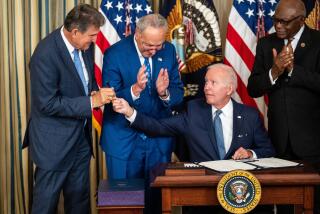House, Senate Negotiators Break Farm Bill Impasse
- Share via
WASHINGTON — House and Senate negotiators, under heavy pressure from Senate GOP leader Robert Dole (R-Kan.) to pass a farm bill this year, reached a compromise late Wednesday and broke an impasse over crop subsidies.
Lawmakers said they would take a tentative farm bill compromise, worked out in a closed session, to a public meeting today. They said a majority of negotiators agreed to the compromise.
The likely agreement was a two-year freeze on grain subsidies with a 2% cut in the third year and a 3% cut in the fourth year--cuts so small that negotiators said the deal was equivalent to a three-year freeze.
“It’s all right,” said Sen. John Melcher (D-Mont.), who had to be satisfied to prevent a filibuster on the Senate floor.
“I’m not dancing with joy,” said Senate Agriculture Chairman Jesse Helms (R-N.C.)
Sen. Edward Zorinsky (D-Neb.), ranking Democrat on the Senate Agriculture Committee, said Agriculture Secretary John R. Block told him that “he couldn’t accept a three-year freeze. I said, ‘Do you want a farm bill?’ and then we started talking about a three-year freeze.”
Zorinsky got a promise of a vote by farmers next summer on higher prices and mandatory acreage cutbacks. But the vote would only be a poll and would not automatically usher in policy changes as required by other referendum proposals.
The tentative agreement followed an impasse at a public session of the House-Senate conference.
Dole, one of the negotiators, put the first farm bill offer on the table, a two-year freeze of grain subsidies, which House negotiators unanimously rejected. House counteroffers varying on a four-year freeze were also rejected.
Senate negotiators also turned down a three-year offer by Melcher, who had threatened to filibuster anything short of a three-year freeze.
“My view is the President would sign a two-year freeze, and I’m not sure he’d sign anything greater than that,” Dole warned negotiators.
A two-year freeze that might be signed by the President “is a bird in the hand . . . for the American farmer,” Dole said. If the farm economy remains depressed, Congress could always extend the freeze for additional years, he said.
The Administration has pushed for a reduction in grain and cotton subsidy levels to hold down costs and remove some of the economic incentive for overproduction in the face of mounting government surpluses and falling exports.
More to Read
Get the L.A. Times Politics newsletter
Deeply reported insights into legislation, politics and policy from Sacramento, Washington and beyond. In your inbox twice per week.
You may occasionally receive promotional content from the Los Angeles Times.










